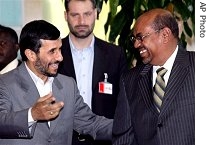-
(单词翻译:双击或拖选)
Nairobi
28 February 2007
Iranian President Mahmoud Ahmadinejad is in Sudan for two days of meetings with his Sudanese counterpart and other officials. The talks are expected to cover the situation in Darfur, Iran's controversial nuclear program, and economic and cultural projects between the two countries. Cathy Majtenyi reports for VOA from Nairobi.
Ministry1 of Information advisor2 Rabie Abdul Atti tells VOA that discussions on Darfur and Iran's nuclear program are expected to top the agenda Mr. Ahmadinejad's visit.

Sudanese President Omar el-Bashir, right, chats with Mahmoud Ahmadinejad before their talks in Khartoum, 28 Feb 2007
Atti says Iran may also offer support to the cash strapped3 African Union troops who are in Darfur to monitor a ceasefire between the government and a rebel group.
"What will be discussed between the two presidents will be, I think, the help that Iran provides to Sudan - financial help - to ensure security and to resolve this crisis in Darfur, and to assist and support [the] Sudan government in the humanitarian4 issues: the return of the displaced to their villages, and also to establish security in the area that is witnessing conflicts between the rebels and the government," he said.
Regarding Iran's nuclear program, Atti says President Bashir will likely encourage his counterpart to pursue peaceful ends.
"I think the stance of Sudan regarding nuclear projects is very clear: that nuclear projects should be used only for peaceful means and not to be used for destructive weapons. I think that Sudan will boost Iran in this direction and not in the direction of making nuclear projects for manufacturing destructive weapons," he said.
Both Iran and Sudan are being heavily criticized by the United Nations Security Council and others in the West: Iran for its uranium enrichment program; and Sudan for its failure to stop the bloodshed in Darfur, which is considered one of the world's worst humanitarian crisis and one the United States has labeled genocide.
The U.N. Security Council is discussing expanding its sanctions on Iran for it's nuclear program.
Sudan has resisted efforts to allow a United Nations peacekeeping force to enter Darfur, where the four-year-old conflict has killed some 200,000 people and displaced more than two million, arguing that such a move would undermine Sudan's sovereignty.
Sudan is also resisting efforts by the International Criminal Court to find and prosecute5 people suspected of committing war crimes in the volatile6 area. The court named two suspects Tuesday, but the Sudanese government vowed7 not to hand them over.
The Iranian president is scheduled to be in Sudan for two days.
Ministry of Information advisor Atti says the two countries are expected to review past agreements and discuss new projects in the areas of agriculture, electricity, gas, and others.
 收听单词发音
收听单词发音
1
ministry

|
|
| n.(政府的)部;牧师 | |
参考例句: |
|
|
|
2
advisor

|
|
| n.顾问,指导老师,劝告者 | |
参考例句: |
|
|
|
3
strapped

|
|
| adj.用皮带捆住的,用皮带装饰的;身无分文的;缺钱;手头紧v.用皮带捆扎(strap的过去式和过去分词);用皮带抽打;包扎;给…打绷带 | |
参考例句: |
|
|
|
4
humanitarian

|
|
| n.人道主义者,博爱者,基督凡人论者 | |
参考例句: |
|
|
|
5
prosecute

|
|
| vt.告发;进行;vi.告发,起诉,作检察官 | |
参考例句: |
|
|
|
6
volatile

|
|
| adj.反复无常的,挥发性的,稍纵即逝的,脾气火爆的;n.挥发性物质 | |
参考例句: |
|
|
|
7
vowed

|
|
| 起誓,发誓(vow的过去式与过去分词形式) | |
参考例句: |
|
|
|















